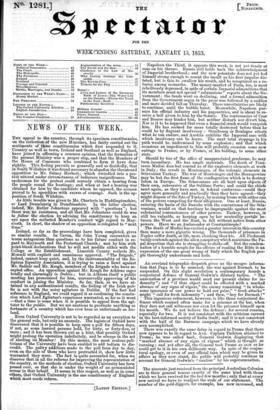NEWS OF THE WEEK.
THE appeal to the country, through its specimen constituencies, on the reelection of the new Ministers, has fairly carried out the sentiments of those constituencies which first responded to it. Country as well as town, Ireland and Scotland as well as England, have joined in affirming a common opinion, that the formation of the present Ministry was a proper step, and that the Members of the House of Commons who combined to form it have done rightly. This feeling prevails so generally and so decidedly, that in South Wiltshire it was found necessary to abandon the threatened opposition to Mr. Sidney Herbert ; which dwindled into a pro- test'uttered under circumstances of ludicrous insignificance. The spokesman for the protest could scarcely obtain a hearing from the people round the hustings ; and when at last a hearing was obtained for him by the candidate whom he opposed, the accuser proved to be speechless with excess of courage. Such is the op- position of South Wiltshire.
As little trouble was given to Mr. Charteris in Haddingtonshire, or Lord Drumlanrig in Dumfriesshire. In the latter election, indeed, Mr. Butler Johnstone appeared with " questions " but there was no resistance, and all that, Mr. Johnstone could do was to follow the election by advising the constituency to keep an eye upon the reelected Member's conduct wish regard to May- nooth. In short, the shadow of an opposition is relegated to "next time."
Ireland, so far as the proceedings have been completed, gives n's similar results. In Cavan, Sir John Young encounters no worse antagonism than questions as to his future conduct in re- gard to Maynooth and the Protestant Church ; met by him with point-blank declarations that he will not meddle either with the College or the Establishment. Limerick County reelects Mr. Monsen with explicit and unanimous approval. "The Brigade," indeed, cannot keep quiet, and, by the instrumentality of the Re- ligious Equality Association, it is trying to raise a howl against Mr. Sadleir and Mr. Keogh, members of the Brigade who have ac- cepted office. An opposi. tion against Mr. Keogh for Athlone rages loudly and alarmingly m Dublin; but in Athlone itself a public meeting has pronounced for him, unreservedly approving of his conduct in joining the Ministry. So far, then, as we have at- tained to any authenticated results, the feeling of the Irish pub- lic is not with the noisy agitators in Dublin. If the fact had reference to England, we could regard it as confirming the conclu- sion which Lord Eglinton's experience warranted, so far as it went —that a time is come when it is possible to appeal from the agi- tator to the public. But we are cautious to predicate anything so fortunate of a country which has ever been so unfortunate as Ire- land.
Even Oxford University is not to be regarded as an exception to the general rule, but only an anomaly. The legists of Oxford have discovered that it is possible to keep open a poll for fifteen days, if not, as some learned persons hold, for forty, or forty-five, or more ; and it has been thrown out as a hint, that possibly Oxford might prolong the operation indefinitely, and be always in the act of electing its Member! By this means, the most zealous poli- ticians of the University have been enabled to add tedium to dis- credit. The paltry additions made to the poll from day to day, even on the side of those who have protracted it, show how little warranted they were. The fact is quite accounted for, when we discover that in all the reforms for improving the representation of the country, or the methods of election, Oxford University has been- passed over, so that she is under the weight of an accumulated arrear in that behalf. It seems in this respect, as well as in some others, that Oxford University is the one constituency of England which most needs reform.
























